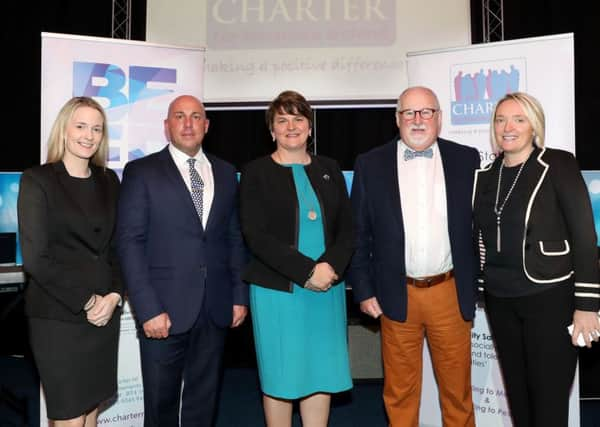'˜No financial malpractice' within Charter NI, says board


It has emerged that the east Belfast community group received funding from public bodies despite submitting incomplete figures for its end of year audit in March 2013.
The Irish News revealed on Thursday that there was a gap in the group’s 2012/13 accounts, after a fire destroyed audit files.
Advertisement
Hide AdAdvertisement
Hide AdThis led to a “qualified opinion” being given by an independent auditor, who stated they were “unable to fully verify the opening balances”.
Despite these holes in the accounts, Charter NI continued to receive funding from the Office of the First and Deputy First Minister and Belfast City Council in 2014.
In a statement to the News Letter, the board of Charter NI stressed that all expenditure incurred by the organisation had been “fully vouched by funding bodies”.
In relation to the 2012/13 accounts, the board added: “These accounts have been publicly available for over three years and not kept secret. The audit was completed and the audit report confirms that all deficiencies had been addressed and rectified.”
Advertisement
Hide AdAdvertisement
Hide AdThe board also clarified that the fire which had destroyed the audit files had taken place at the property of an independent auditor, not in Charter NI premise.
Further, Charter expressed concerns that it was being unfairly portrayed in the media, adding: “We are concerned that a perception is being created of financial malpractice within Charter and this impression is completely unfounded.
“We meet the same standards of checks and balances as are applied to every body in receipt of public funds.”
Charter NI recently received £1.7m in public money, drawn from the Assembly’s Social Investment Fund (SIF).
Advertisement
Hide AdAdvertisement
Hide AdThe group has come under scrutiny since October, when chief executive Dee Stitt - a leading loyalist - referred in an interview with the Guardian to his loyalist band the North Down Defenders as “homeland security”.
Mr Stitt faced increasing pressure to step down in the wake of his comments, and it has been reported that Charter NI handed him a final written warning.
Meanwhile, Assistant Chief Constable Stephen Martin said this week that “an individual or individuals connected” to Charter NI had links with paramilitarism.
ACC Martin told BBC’s Nolan Show: “Charter as an organisation does very good work on the ground but clearly there are connections within that organisation to the UDA.
Advertisement
Hide AdAdvertisement
Hide AdCharter NI recently received £1.7m in public money, drawn from the Assembly’s Social Investment Fund (SIF).
The SDLP has urged auditors to investigate the controversial fund, which is meant to deliver 68 community projects, 17 of which are already operational.
A government document leaked to BBC’s Spotlight programme revealed the scheme – set up by Stormont to deliver social change – is likely to run £13m over budget.
In response to these calls for a probe into the scheme, the NI Audit Office told the News Letter: “The Audit Office acknowledges that the Social Investment Fund is an important high profile area of public expenditure.
Advertisement
Hide AdAdvertisement
Hide Ad“It has been keeping it under review and in the year ahead it will carry out more detailed audit work which may lead to a public report in due course.”
A spokesperson for the Executive Office said the overspend “does not represent mismanagement of finances”, adding: “There are factors beyond the department’s control which can result in the need for additional funding.
“These include rising construction costs and unforeseen issues emerging during the detailed design and construction phase (eg discovery of asbestos).
“Every effort of course will be made to manage these should they arise.”